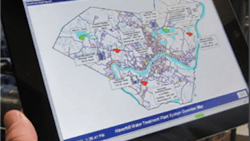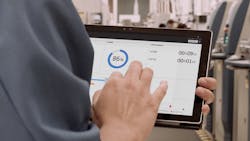Leveraging Software for Asset and Process Management
When the COVID-19 pandemic hit in early 2020, the Water and Wastewater Division of Haverhill, Mass., was ahead of the game — the managers and operators of the plant had been using remote digital access to control every step of their processes for 13 years. Instead of closing down operations, the plant was able to operate remotely, ensuring that the city’s water system could continue to supply water services to 58,000 homes and businesses in the Haverhill area.
In today’s environment, this capability would have afforded many water facilities and their management teams peace of mind. The essential function of the water treatment plant means that, even in a pandemic, water and wastewater plant workers still need to report to the site, or at least have access to the systems that run the plants from another location. Many plants are manned 24 hours a day, seven days a week to ensure the highest quality water is delivered each day to a region’s residents. Water quality needs to be constantly monitored to make sure that it meets both state and federal water quality standards at all times.
In addition, short staffing is becoming a concern of many utilities, particularly small organizations. For example, a Midwest municipal treatment plant that serves a population of 67,000 had difficulty keeping the overnight position staffed Remote monitoring helped this utility to lower costs for night-time monitoring and alarms, provide faster response, and lower their risk with reliable alarm management and supervisory control and data acquisition (SCADA).
As utilities grow, they need access to process variables and control elements to maintain the reliability and security of the system. A Brazilian company that supplies water and sewage services uses remote access to verify and analyze real-time and historical data. Access is available to a wide variety of users, including management personnel and other work groups.
Enabling Remote Access
So, how do water facilities make this kind of secure asset and process management possible for their plants and employees? How do they enable operations to continue without actually being in the plant?
Today’s environment is forcing utilities to discover new ways to run municipal operations safely and efficiently. Whether due to remote locations, industry dynamics or distributed workforces, more industries are decentralizing operations. And, for operational agility, they need solutions that enable independent work without undue risk to safety or security.
Remote operations are a critical component of successful, long-term asset and process management as industrial organizations seek to empower today’s workforce. The water and wastewater industry can leverage software to ensure plant systems stay up and running despite global pandemics, unpredictable weather, and unforeseen circumstances.
Over the last 40 years, HMI/SCADA has become more powerful and sophisticated. It has progressed from the inflexible proprietary systems of the 1980s and the LAN-based, I/O-centric systems of the 1990s to the network-based, equipment and process-centric systems of today. Efficient human machine interface (HMI) design, structured asset-based modeling, historical and real-time trending, and recent web standards can build a HMI/SCADA that acts like an extension of the operator.
Whether maintaining a water treatment, distribution, collection, wastewater system or plant, operators are a critical part of providing an adequate and safe supply of water. Yet, today’s operators are faced with ever-increasing process complexity. Producers need to control costs and meet growing needs with either equal or fewer staff. In small plants, a single operator might be responsible for maintaining all the equipment, including interaction with chemicals, equipment inspection, operating equipment, and environmental reporting. What’s more, resources for water and wastewater capital programs are limited, making it difficult to carry out infrastructure modernization, infrastructure expansion, or technology upgrades.
Operator-centric HMI/SCADA is an idea whose time has come. Preventable operator error can cost billions in unscheduled downtime and poor quality. Reducing these errors can bring a significant gain in productivity, reliability and the provider’s bottom line.
Empowering Workers
The good news is that today’s operators are more mobile than ever before. Their work often takes them out of the control room, onto the plant floor or to remote locations. But wherever they go, HMI based on HTML5, which is compatible with most common browsers and supports multi-touch applications, can keep them connected. A responsive design can scale to adapt to the form factors, orientations and capabilities of displays that operators might use, from tablets and smartphones to terminals and HTML-compliant panel boxes.
One of the fascinating impacts of the age of IoT is the merging of two trends: a workforce of digital natives comfortable with technology, and technology toolsets that show operators information from various business systems on their device of choice. The newest tools offer mobile operator support, including user interface responsiveness to device type (desktop, tablet, phone, smartwatch).
With remote operating solutions, water operators can rapidly enable remote/mobile monitoring and assistance for on-site HMI systems. Central operators can control remote/mobile worker access by time and equipment, ensuring that remote, mobile and on-site staff can work independently or together in a compliant environment. This provides a utility with the flexibility to empower operators.
Deploying remote operations with organization-wide SCADA connectivity across the entire water system allows utilities to realize centralized operations. Remote operations unlock a holistic view of performance, fill data gaps, increase collaboration and enable centralized consistency across plants and sites. Information can now be made readily available to all levels of the organization through highly secure-by-design hardware.
Enabling remote access empowers business to centralize their operations, increase efficiency and reduce downtime — no matter what is happening in the world. WW
About the Author: Ranbir Saini is the senior director of product management for automation software at GE Digital. He has more than 20 years of experience delivering industrial automation, operations management, and media content-creation software to OEM, municipal, and enterprise customers. Saini has a passion for designing compelling and innovative solutions in the physical and digital space that make a meaningful difference to customers, human experiences, and society.About the Author

Ranbir Saini
Ranbir Saini is the senior director of product management for Automation Software at GE Digital. He has more than 20 years of experience delivering industrial automation, operations management, and media content-creation software to OEM, municipal, and enterprise customers. Saini has a passion for designing compelling and innovative solutions in the physical and digital space that make a meaningful difference to customers, human experiences, and society.

